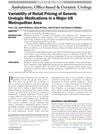 6 citations,
August 2006 in “Journal of Cutaneous Pathology”
6 citations,
August 2006 in “Journal of Cutaneous Pathology” Two teenage brothers had a rare, treatment-resistant form of female-pattern hair loss with unusual scalp changes.
 6 citations,
May 2004 in “Dermatologic Surgery”
6 citations,
May 2004 in “Dermatologic Surgery” The article concludes that using the single-scar technique for hair transplants can result in a more attractive scar and that concerns about the technique can be managed with proper methods.
 5 citations,
August 2018 in “Urology”
5 citations,
August 2018 in “Urology” Independent pharmacies generally offer lower prices for certain generic urologic medications than chain pharmacies.
 5 citations,
November 1992 in “Current problems in dermatology”
5 citations,
November 1992 in “Current problems in dermatology” Glucocorticoids are powerful anti-inflammatory drugs that must be used carefully to avoid serious side effects.
 3 citations,
October 2020 in “Journal of Transfusion Medicine”
3 citations,
October 2020 in “Journal of Transfusion Medicine” Platelet-rich plasma therapy is seen as a promising tissue repair method but lacks standardized protocols.
 2 citations,
July 2022 in “Frontiers in Medicine”
2 citations,
July 2022 in “Frontiers in Medicine” The cause of Frontal fibrosing alopecia, a type of hair loss, is complex, likely involving immune responses and genetics, but is not fully understood.
 2 citations,
January 2015 in “Nihon Rinshō Men'eki Gakkai kaishi”
2 citations,
January 2015 in “Nihon Rinshō Men'eki Gakkai kaishi” Scientists developed a method to regenerate salivary glands using stem cells.
 2 citations,
January 2014 in “Hair therapy & transplantation”
2 citations,
January 2014 in “Hair therapy & transplantation” Using 5% Minoxidil solution with oral chelated zinc supplement can effectively treat female pattern hair loss.
 1 citations,
June 2023 in “Genes”
1 citations,
June 2023 in “Genes” Hair loss from Alopecia Areata is caused by both genes and environment, with several treatments available but challenges in cost and relapse remain.
 1 citations,
June 2023 in “Ethnobotany research and applications”
1 citations,
June 2023 in “Ethnobotany research and applications” The review concludes that the Ziziphus species, especially jujube, may promote hair growth and have various health benefits, warranting more research.










